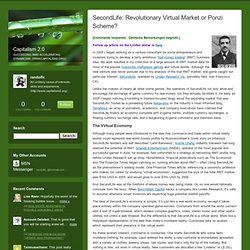

IntellectualProperty. Your real tax rate: 40% Capitalism 2.0: SecondLife: Revolutionary Virtual Market or Ponz. The Virtual Economy Although many people were introduced to the idea that commerce and trade within virtual reality worlds could represent real world money profits by BusinessWeek’s cover story on infamous SecondLife resident and self described “Land Baroness”, Anshe Chung, industry followers had long realized the potential of RMT.

Shanda Entertainment (SNDA), operator of the most popular and successful games in Asia, for example, had committed to a strategy of harvesting RMT profits long before Linden Research set up shop. Nonetheless, financial publications such as The Economist and The Financial Times began catching on, running articles about RMT – often citing SecondLife as the phenomenon’s leading model. One Financial Times article, referencing a university professor who makes his career by studying “virtual economies”, suggested the size of the total RMT market was $1bn USD in 2005, and would grow to over $7bn USD by 2009. Why Online Games Are Dictatorships. Online games like World of Warcraft and Second Life are absolute dictatorships, where the whim of the companies controlling them is law.

Cory Doctorow wonders if it's possible to create a game that's a democracy, where your in-world property is really yours. Can you be a citizen of a virtual world? That's the question that I keep asking myself, whenever anyone tells me about the wonder of multiplayer online games, especially Second Life, the virtual world that is more creative playground than game. These worlds invite us to take up residence in them, to invest time (and sometimes money) in them. Second Life encourages you to make stuff using their scripting engine and sell it in the game. Business Intelligence Lowdown: How to Be a Manager that Your Emp.